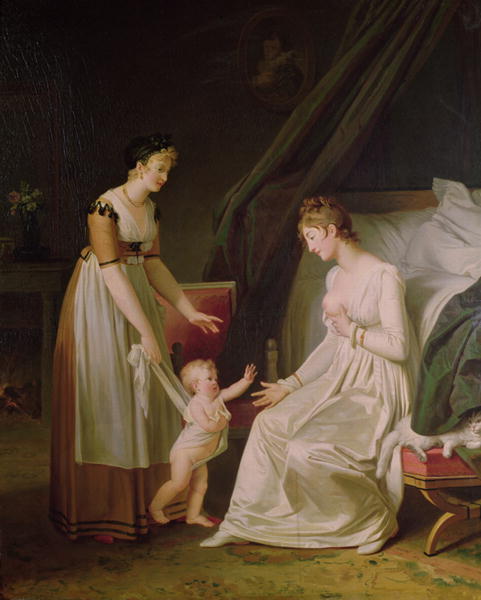The latest scandal around Facebook’s ban on images of nursing mothers, which show a glimpse of the areola or nipple, only presents us with the latest case of nipplephobia – an extreme panic reaction at the view of the female nipple (to my knowledge the male nipple fails to exert such power). Facebook’s action was a misguided enforcement of its obscenity standard, as nipples in themselves are not obscene, whether they are used to feed a baby or not.

Marguerite Gerard, The Breastfeeding Mother (19th C)
Obscenity infolves a sexually explicit act. Simple nudity – with no intended sexual overtones – is not obscene no matter what some fevered imagination can project onto it. Seeing nursing as a sexual act is quite perverse on the part of Facebook, yet not an isolated one.
The centuries-old tradition of representing a mother—be it an ancient goddess, the Virgin Mary, or a 17th century Dutch housewife—nursing a child did not stop officials at an airport outside Newburgh, NY, for instance, from removing a painting of a nursing mother by Shawn Dell Joyce a few years ago. An airport spokeswoman, responding to passengers’ complaints, proclaimed that breast-feeding is “a controversial issue all over the world.”
Hardly “all over the world,” but certainly in the U.S., where federal legislation has been required to protect women’s right to breast-feed (however only on federal property). States have also enacted legislation clarifying that breast-feeding is not an “obscene act,” “lewd touching,” or “immoral conduct.” Such legislation is necessary because, in the U.S., the public apparently associates the female breast almost exclusively with sex and lewd behavior.
The flash of Janet Jackson’s breast on television catalyzed a tellingly disproportionate decency panic: Congress immediately debated increasing FCC indecency fines; to play it safe, NBC cut a glimpse of an elderly patient’s chest from an ER episode; and all TV networks introduced a delay in the airing of live events so that no more unruly breasts could traumatize sensitive viewers.
Just about a year ago drawings by Lubbock, TX artist Lahib Jaddo that were banned from being shown at the city-financed Buddy Holly Center included one of a woman nursing an infant.
Facebook, a privately owned site, has the legal right to impose whatever standards they want, but the public character of the use of the site, and social networking sites in general, ensures those standards have consequences in the public sphere. Behaving as if any glimpse of a female breast is indecent, even obscene, has the unfortunate effect that it actually convinces many to view the body and its most natural and innocent actions (such as breast feeding) as somehow shameful and embarrassing. As a result nursing mothers get hostile looks when they feed their babies in a park or restaurant.
Who has an interest in making the human body an object of shame? We find one answer in religion. Another one is suggested by former top model and media activist Ann Simonton, who, back in 1984 stated, “If women’s breasts weren’t hidden in shame or seen as obscene and wicked, how could Madison Avenue, pornographers, movies and television profit from their exposure?”

